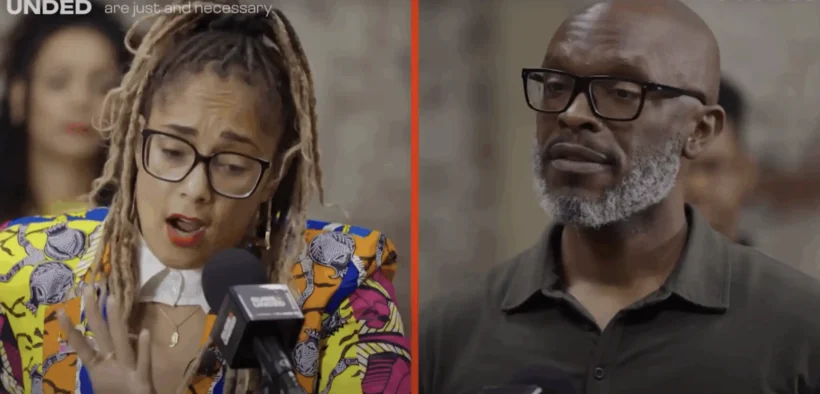Amanda Seales Faces 20 Black Conservatives in Fiery Debate on Race and Inequality
Share

Comedian and activist Amanda Seales once again proved her debate skills during an appearance on Jubilee’s Surrounded, where one expert faces off against 20 opponents in a timed discussion.
In her episode, Seales squared off against 20 Black conservatives, sparking a heated debate that highlighted deep ideological divisions within the Black community.
Amanda opened the debate with a bold claim: reparations for descendants of slavery are “just and necessary.” She argued that such measures would help address the persistent disparities Black Americans face, a position supported by decades of scholars and activists.
Some opponents dismissed reparations as a symbolic gesture, arguing that simply “cutting a check” would not solve systemic issues. Seales countered by citing historical examples, including reparations given to Jewish Holocaust survivors and Japanese Americans interned during World War II.
She also highlighted that approximately two-thirds of Black Americans support reparations, according to Pew Research, framing the conversation as both feasible and essential.
When the debate turned to crime within Black communities, Seales reframed the discussion. Critics argued that Black-on-Black crime demonstrates a lack of personal accountability. Seales responded that over-policing and chronic underinvestment in Black communities, particularly in education, fuel cycles of violence. She stressed that addressing these structural issues is more effective than placing blame on individuals.
Seales also confronted denials of systemic racism. Opponents like Matt Nuclear argued that systemic racism does not exist, but Seales highlighted the historical and ongoing evidence: from Reconstruction-era legislation to the 13th, 14th, and 15th Amendments, as well as mass incarceration and redlining practices.
“Because this country has never dismantled the culture of racism, it still exists in practice,” she said, emphasizing that systemic inequities are codified in both history and modern policy.
Finally, Seales critiqued Black conservatism, arguing that it often fails to address inequalities in job access, fair pay, and essential resources.
The discussion shifted into tangents about race, ethnicity, and Black culture, but Seales maintained her point: conservative policies have historically opposed wage increases and supported segregationist structures, further perpetuating inequality in Black communities.


















